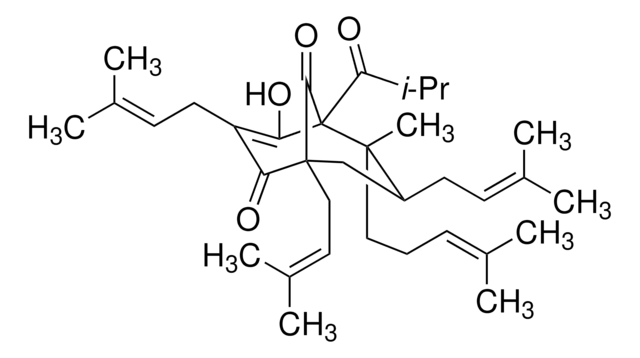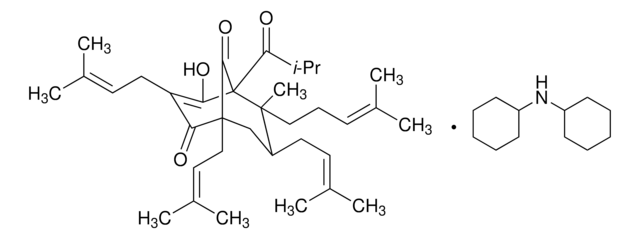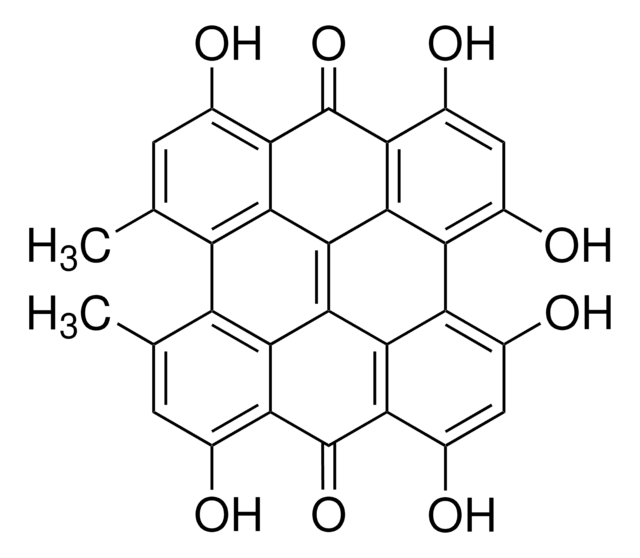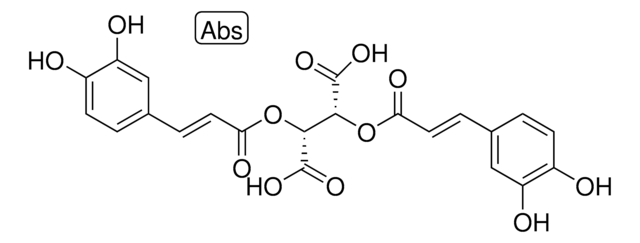H1792
Hyperforin (dicyclohexylammonium) salt
Synonym(s):
Hyp-DCHA, Hyperforin-DCHA
About This Item
Recommended Products
Assay
≥98% (HPLC)
Quality Level
form
powder
storage condition
protect from light
color
white to off-white
solubility
DMSO: ≥10 mg/mL
storage temp.
−20°C
SMILES string
C1CCC(CC1)NC2CCCCC2.CC(C)C(=O)[C@@]34C(O)=C(C\C=C(\C)C)C(=O)[C@@](C\C=C(\C)C)(C[C@H](C\C=C(/C)C)[C@@]3(C)CC\C=C(\C)C)C4=O
InChI
1S/C35H52O4.C12H23N/c1-22(2)13-12-19-33(11)27(16-14-23(3)4)21-34(20-18-25(7)8)30(37)28(17-15-24(5)6)31(38)35(33,32(34)39)29(36)26(9)10;1-3-7-11(8-4-1)13-12-9-5-2-6-10-12/h13-15,18,26-27,38H,12,16-17,19-21H2,1-11H3;11-13H,1-10H2/t27-,33+,34+,35-;/m0./s1
InChI key
ZUYCAROZOLUHJY-DNSWOBEMSA-N
Looking for similar products? Visit Product Comparison Guide
Biochem/physiol Actions
Signal Word
Danger
Hazard Statements
Precautionary Statements
Hazard Classifications
Acute Tox. 4 Oral - Aquatic Acute 1 - Eye Dam. 1 - Skin Corr. 1B
Storage Class Code
8A - Combustible, corrosive hazardous materials
WGK
WGK 3
Flash Point(F)
Not applicable
Flash Point(C)
Not applicable
Certificates of Analysis (COA)
Search for Certificates of Analysis (COA) by entering the products Lot/Batch Number. Lot and Batch Numbers can be found on a product’s label following the words ‘Lot’ or ‘Batch’.
Already Own This Product?
Find documentation for the products that you have recently purchased in the Document Library.
Articles
A hard disk drive (HDD) is a data storage device that stores digital information by magnetizing nanosized magnets on flat disks and retrieves data by sensing the resulting magnetic field.
Our team of scientists has experience in all areas of research including Life Science, Material Science, Chemical Synthesis, Chromatography, Analytical and many others.
Contact Technical Service



![[6]-Gingerol ≥98% (HPLC)](/deepweb/assets/sigmaaldrich/product/structures/259/444/6877889c-1cc0-47f5-b807-f847deadec1d/640/6877889c-1cc0-47f5-b807-f847deadec1d.png)

![[8]-Gingerol](/deepweb/assets/sigmaaldrich/product/structures/408/530/af2f2837-3419-4e07-a72b-24e95af0d7ce/640/af2f2837-3419-4e07-a72b-24e95af0d7ce.png)



